- Home
- Lauren Willig
The Summer Country Page 39
The Summer Country Read online
Page 39
As she hurried toward the River along the road, joining scattered groups from other plantations heading in the same direction, she allowed herself to imagine Charles’s reaction. Shock, of course. But, she thought, in the end, relief. He’d wanted this too. It was just that their methods were, of necessity, different. He’d failed with the pen; now it was her turn to try the sword.
The dance was well under way in the slave yard at the River by the time Jenny arrived.
“You’re late. In here.” Jackey hurried her back to one of the huts at the very edge of the yard, well removed from the festivities.
“What kept you?” demanded Nanny, from the shadows.
Jenny blinked as her eyes adjusted from the brilliant light of the bonfires to the dimness of the hut. She could just make out Nanny Grigg, Cain Davis, Washington Franklin, and King Wiltshire and Bussa from Bayleys sitting around a square of fabric.
“I thought my mistress wasn’t going to let me go. She’s worried I’m forming an attachment.”
Nanny snorted. “That’ll be the least of her worries in another two days. We’ve just done the flags,” she added, gesturing to the cloth.
“Every army needs a flag,” said Bussa, grinning at her in the darkness. General Bussa, the others had begun to call him; of them all, he was the most involved in the military aspect of their plans.
Jenny looked down at the flag on top. The king and queen, conspicuously dark skinned, sat on either side of a black man wearing a tricorne and holding a musket as a royal warship sailed to his aid. Below them, a well-dressed black man and woman held hands, looking imploringly to the king and queen for their liberation.
Scrolled across the bottom of the flag, the legend read: Happiness ever remains the endeavour. Britannier are always happy to help all such sons as endeavour.
Jenny recognized the elegantly curved hand as Washington Franklin’s.
“We’ll get what they wanted for us,” said Jackey, touching his fingers to the figure of the queen. “Who knows? Maybe they’ll send to our aid when they hear.”
“I heard there might be troops coming from ’Mingo,” said King Wiltshire. “Frenchmen come to help us.”
“God saves those who endeavor for themselves,” said Nanny firmly. She bundled the flags out of the way. “We can’t rely on anyone but our own selves. They’ll bring the militia out on us, so we’ll have to act fast and make sure we act together. There’ll be fires to signal the time. Bussa’s to start at Bayleys.”
Bussa nodded. “Sunday at sunset.” He drew a map in the dust, using buttons for landmarks. “First Bayleys . . . then Rivers . . . Mapps . . . the Thicket . . . Three Houses . . . Golden Grove. As soon as I light the cane trash, the others will follow.”
“I’ve a great pile of corn in my garden ready to light,” said Cain Davis. “I’ve spread the word as far as I can; I’ve gone from house to house. We’re as ready as we’ll ever be.”
“We’ll have half the island in flames before they realize an ember’s been sparked,” said Jackey, with satisfaction.
“They’ll wake in the night to the smell of their cane burning,” said Nanny, with grim satisfaction. “That’ll wake them up all right.”
“And then to arms,” said Bussa quietly. “On the first night, they’ll cry water, and on the second night, they’ll cry blood.”
“Not Peverills.” The words were out before Jenny realized she’d spoken them. “Whatever you may think, Charles Davenant’s a good man. He means us well.”
Jackey folded his arms across his chest, leaning back against the rough wood wall. “He didn’t mean us well enough to give us our freedom.”
“He’s one man among many in the council. What was he to do?” Jenny looked around the circle, from one to the next. “Peverills is one plantation among many.”
“It’s one of the oldest,” said Franklin thoughtfully. “It will mean something to see it burn.”
“But not one of the richest,” Jenny argued. “There are better targets. If you want to make them quake, you’ll fire St. Nicholas Abbey or Sunbury.”
Jackey looked at Franklin, then at Bussa, who nodded slightly, and then back to Jenny. “All right. Peverills for your loyalty.”
“We don’t need to buy her loyalty,” said Nanny, moving to put an arm around Jenny’s shoulders, like a mother hen taking her chick under her wing. “Jenny is with us, aren’t you? She’s been with us from the first, and I won’t hear a word against her. If she wants us to leave Peverills be . . . well, there are plenty of other fields to burn.”
“What about Beckles?” asked Bussa.
Mary Anne and Neddy were to go to Peverills to eat their Easter dinner with Charles and Lottie. She would, Jenny decided, make sure they stayed there, if she had to break the axle of the carriage with her own two hands.
“Burn it,” she said. “Burn every last cane and sow the ground with salt, and I’ll come and dance on the ashes.”
Christ Church, Barbados
Easter 1816
“I wish you’d let me hold a proper celebration for you,” Charles said to Jonathan. “A dance, perhaps.”
They were back from Easter services, still trailing the odor of sanctity about them. Carlota had been carried off to bed, protesting, by her nursemaid. Neddy had fallen quietly asleep in a corner of the pew and been borne back to Beckles. The adults sat over their supper, a farewell supper as well as an Easter one.
“With rum punch and everyone whispering about how I’m marrying above my station?” Jonathan looked pointedly at Mary Anne, who very deliberately pretended not to notice. “No, thank you. I’m just as happy to slip off quietly. I’ll come back when I’m too important to ignore.”
“Don’t forget us once you’re grand,” said Charles.
“Forget my Lottie? Never.” Jonathan took a hearty swig of his claret, the good claret, which Charles had brought out in honor of the occasion. “I’ll visit to make sure you’re taking care of her proper.”
“I think I can manage,” said Charles, trying not to betray his annoyance. Yes, he was delighted to see Lottie enveloped in affection, but Jonathan contrived to make him feel unfit. It didn’t help that Jenny was standing behind Mary Anne’s chair. She did her best to hide it, but he knew she felt he’d failed her. “You go and enjoy your honeymoon. You’re bound for Antigua?”
“We’re to be married from Antigua and then sail for the Carolinas.” Jonathan’s rather harsh-featured face lit when he spoke of his bride. Personally, Charles didn’t quite see it, but he was delighted that Jonathan did.
Jack shall have Jill; / Nought shall go ill. Charles wished it were as simple as that, that there were a deus ex machina out of a Shakespeare comedy who could sprinkle fairy dust on them all and make it all come out right, everyone with his proper mate.
His mate was there, standing just behind his sister-in-law, but he couldn’t acknowledge her, not by a word, not by a smile.
Was it worth it? Sometimes Charles wondered. He was proud of the changes he’d made to Peverills, but they were so small, so little in the grand scheme of things. Change, if it came, wasn’t going to come from men like him, tinkering on their plantations, but from men like Wilberforce, holding forth in the House of Commons. They might have run away together years ago, been together with their child, sailed away like Jonathan and his bride, Jonathan, who was beaming like he’d made the very earth and found it good.
It was the claret, making him maudlin. Charles caught himself just before he looked at Jenny and made himself smile at Jonathan instead.
“I wish you very happy,” said Charles. He raised his glass. “A toast to you and your bride. May you have long and happy lives together.”
“I’ll drink to that,” said Jonathan.
“You don’t drink to a toast in your own honor,” protested Mary Anne.
“There’s no need to stand on ceremony. We’re all family here.” Charles nodded at Jonathan. “I account Jonathan family. I couldn’t have held Peverills without him and I don’t kno
w what I’ll do when he’s gone.”
“Run it all into the ground within a year,” said Jonathan with a grin. His face changed, and he lifted his head, sniffing. “What is that smell?”
Now that he mentioned it, Charles could smell it too, like caramel, a burnt-sugar smell that singed the nose and clung to the back of the throat. “I hope Cook isn’t attempting French tarts again. We had burnt pears for days.”
Mary Anne rose from her chair, her fork still in her hand. “That’s cane. That’s cane burning.”
Jonathan’s groom London came running into the room. “There’s word come from Bayleys. There’s plantations burning all across St. Philip!”
“What?” Charles stared at the boy, uncomprehending. The last revolt on the island had been so long ago, it was out of all memory, in the days when there was still a Stuart on the throne of England and men wore wigs that fell in curls past their shoulders. “It must be some mistake—cane trash burning that got out of hand. . . .”
“No mistake, Master Charles.” London’s eyes were bright with excitement. “There’s men marching under banners. They’re headed straight here. Simkin from Bayleys said.”
They weren’t supposed to be here. Behind Mary Anne’s chair, Jenny stood, disbelieving. They weren’t supposed to be at Peverills. Jenny knew the plan, knew it down to the minute. Beckles, yes, but not Peverills. They had agreed.
“Excuse me,” said Jonathan, and pushed away from the table, hurriedly leaving the room.
The sounds of the mob were growing closer now; Jenny could hear the shouting. Through the window, she could see the red glow of torches, brighter and brighter.
Charles stood up, the candlelight turning his features into something out of a storybook, a knight about to go into battle. “I’ll go speak to them.”
“Don’t be a fool, Charles,” said Mary Anne, looking at her fork in confusion and then flinging it down. “If you ignore them, they’ll shout a bit and go away.”
There was the crash of broken glass from the front of the house, followed by a shout.
“I won’t be a moment,” Charles said, and his eyes met Jenny’s. “Don’t worry.”
Don’t worry? She had to get them out of here, she had to get them all out of here. Where would be safe? The mill? They would burn the mill. The bookkeeper’s house? Maybe. Beckles? She’d told them to burn Beckles, to burn Beckles and sow the ground with salt. Peverills was supposed to be safe. Lottie was supposed to be safe.
“Lottie.” Jenny’s throat was dry, her hands cold. She dropped Mary Anne’s fan and shawl and bolted for the door.
“Jenny! Where do you think you’re going? Jenny!”
Peverills wasn’t like Beckles; it hadn’t been built to a simple plan. There were rooms off of rooms, stairs that led up and then down. Lottie’s room was in one of the wings.
“Fire!” someone shouted, and another anxious voice took up the cry. Outside, people were running to and fro. Jenny heard the high and anguished whinny of a horse run wild. “Fire!”
Mary Anne grabbed her by her arm. “For heaven’s sake! Don’t lose your head. Come away. We’d best get back to Beckles—if we still can.”
She could hear the crackle of fire, timbers burning, stone crumbling. Charles was in the fields, and Lottie, Lottie was in her bed, in the back of the house, in the back of the house where the fire was raging.
Oh God. What had she done? Not Peverills, they’d promised. Not Peverills.
“Lottie!” she shouted, hoping against hope that she would see a little body in a white nightdress stumbling toward her. Her words disappeared into the howl of the flames and the cries from outside.
“Jenny!” Mary Anne tugged at her arm. “This way. Now.”
“Let go!” Half-mad with fear, Jenny yanked away so hard she sent her mistress stumbling. “My baby—I have to get my baby.”
Without looking back, she ran toward the rear of the house, toward the fire.
Mary Anne’s shout and a rending noise were the only warning she had before the flaming beam came hurtling down, straight toward her head.
Chapter Twenty-Seven
Christ Church, Barbados
August 1854
Emily’s room at Beckles was waiting for her, just as it had been.
One would never know that only an hour away, thousands of people had died; one would never know that they were dying even now. The furniture smelled of lemon oil and beeswax. Her brushes and combs were on the dressing table, silver shining with polish. The mirror glittered in the sunlight that slanted through the jalousies.
There had been water left for her in the washstand. Emily found herself eyeing it askance. “If it wouldn’t be too much trouble,” she asked Katy, “could you see that my wash water is boiled?”
She could tell that the maid thought it a rather eccentric request, hot water in the heat of the day, but she took the pitcher all the same.
“How is your little girl?” Emily called after her, but Katy must not have heard, because she didn’t answer.
Emily began to unpin her cuffs, feeling out of place and out of sorts. As soon as the message arrived from Beckles, it was taken as a given that she would go back; there could be no reason for her to stay in Bridgetown now. Cousin Bella had helped her to pack “her” things, although precious little of them were hers. Emily had felt, discomfitingly, that she was being chivvied away.
There had been no time to speak with Nathaniel alone, and Emily wasn’t sure whether to be annoyed or relieved by that.
What was there to say?
On the other hand, it was far more disturbing to think that there might be nothing to say, that that kiss had been nothing more than relief, relief that the death toll had slowed, that the plague had lifted.
It was hardly a romantic thought.
But what else did she expect? What could possibly come of it?
“Emily?” Laura poked her head around the door. “They told me you were back.”
“Oh, Laura.” Emily jumped out of her seat, and stopped, unsure of herself. It was the color that struck her first, or, rather, the absence of it, the black of Laura’s widow’s weeds blending with the black of her hair, contrasting with the translucent pallor of her skin. “I’m so sorry. I’m so very sorry.”
“Thank you,” said Laura.
“I wouldn’t blame you if you blame me,” said Emily miserably. “I did try, you know. I thought he was getting better. He seemed to be getting better. It was so sudden, in the end.”
Laura stepped inside, closing the door behind her. She had reefed up the top hoop of her dress, but it did more to emphasize than hide her condition. “I’m sure you did everything you could.”
Emily tried very hard not to stare. “I would have come back sooner. I would have told you about Adam myself and not by letter. But I didn’t want to bring the infection back to you. Not in your condition.”
“You knew?” Laura looked ruefully down at her bulging belly. “I suppose Adam told you.”
“No. Nath—Dr. Braithwaite guessed.” Emily choked over his name, feeling, obscurely, that she hadn’t the right to use it anymore, not unless he explicitly granted it to her. Not after the kiss. Turning her attention back to Laura, she asked, “Why didn’t you tell me? Adam said you didn’t want me fussing over you.”
Laura shook her head, drifting over to the dressing table, where she fiddled with Emily’s silver brush, moving it from one side of the table to the other. “That wasn’t it.” She looked up at Emily, looked at her directly for the first time in months. “I didn’t want to tell you because if I told you, it would mean it was real, that I was married, and—and having a baby.”
“But you are married and having a baby,” said Emily, thoroughly confused. “It’s not as though you weren’t married and having a baby. I was at the wedding. Unless—don’t tell me there was some irregularity?”
“Irregularity?” said Laura. “Oh no, nothing like that.”
“Oh good. I wouldn’t have
put it past Adam to have married a barque of frailty and then tried to hide it to make Aunt Millicent happy, or just pretended it never happened.” Remembering to whom she was speaking, Emily abruptly broke off. “Not that he would have done such a thing. What I mean is—”
“No,” said Laura eagerly. “What you mean is exactly what you meant. You used to speak your mind to me, you know, before I married Adam. But then it changed everything. You looked at me differently. As though I weren’t myself anymore. And Adam—”
“I didn’t mean to shut you out.” Emily stared at Laura in confusion, the past nine months running through her head in a jumble. “I thought you didn’t need me anymore. You were a married lady and I—I was just a spinster cousin.”
“You’re his cousin. And you were always so close.” Laura sat down heavily on the little chair in front of the dressing table. “What could I say to you? I couldn’t tell you how unhappy I was. It would have put you in an impossible position. How could I tell you? You would have gone straight to Adam.”
There was no denying that. She had put Laura’s distance down to the constraints caused by the new gulf in their circumstances. It had never occurred to her that Laura might be unhappy, that Laura might need her. “Well . . . yes. But mightn’t that have helped?”
“Or made it worse.” Laura pleated her fingers together against the black stuff of her skirt. “I’m not sure how to explain it. He wasn’t . . . unkind. But once we married, it was as though he became someone else entirely. Anything I found interesting bored and frustrated him. I bored and frustrated him. When we were courting, Adam seemed so sure. He was sure enough for both of us.”
“You never said,” said Emily softly. She felt awful. She had prided herself so on her ability to judge character, and yet she had misjudged Laura so entirely, had misunderstood everything that had passed between them.
“I didn’t expect him to be tied to my skirts.” Laura looked up at Emily, delicate purple circles under her eyes. “I didn’t need him to share my interests. But for him to pretend to it and then . . . At least, you never pretended.”

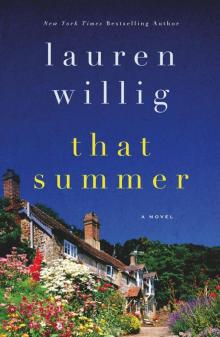 That Summer
That Summer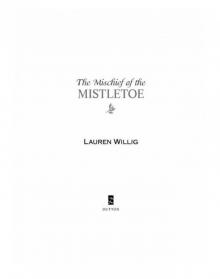 The Mischief of the Mistletoe
The Mischief of the Mistletoe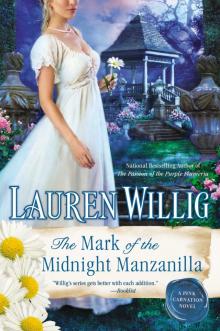 The Mark of the Midnight Manzanilla
The Mark of the Midnight Manzanilla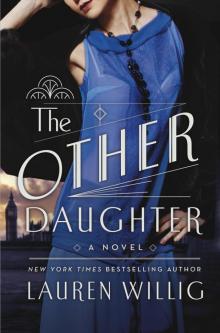 The Other Daughter
The Other Daughter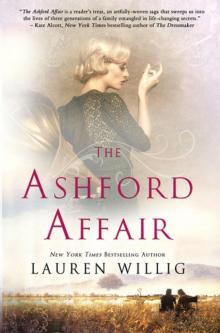 The Ashford Affair
The Ashford Affair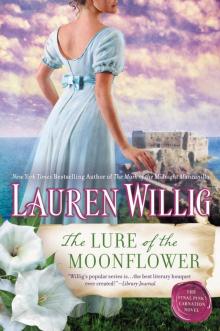 The Lure of the Moonflower
The Lure of the Moonflower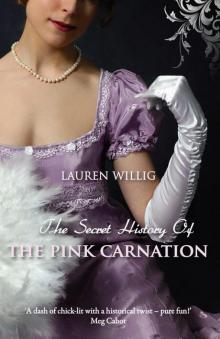 The Secret History of the Pink Carnation
The Secret History of the Pink Carnation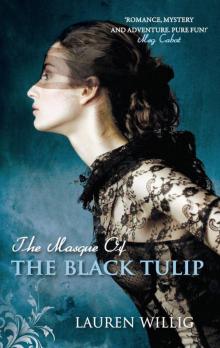 The Masque of the Black Tulip
The Masque of the Black Tulip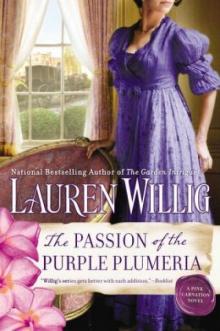 The Passion of the Purple Plumeria
The Passion of the Purple Plumeria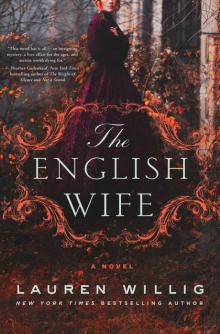 The English Wife
The English Wife The Garden Intrigue
The Garden Intrigue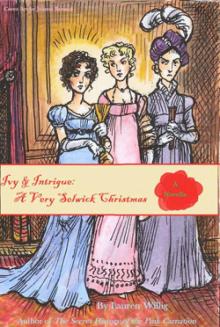 Ivy and Intrigue: A Very Selwick Christmas
Ivy and Intrigue: A Very Selwick Christmas The Orchid Affair
The Orchid Affair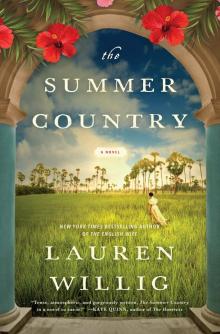 The Summer Country
The Summer Country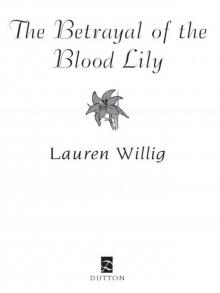 The Betrayal of the Blood Lily
The Betrayal of the Blood Lily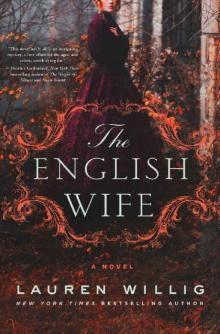 The English Wife: A Novel
The English Wife: A Novel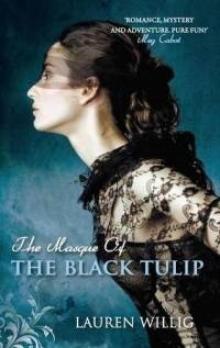 Masque of the Black Tulip pc-2
Masque of the Black Tulip pc-2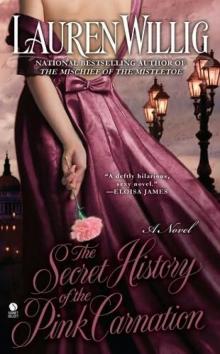 The Secret History of the Pink Carnation pc-1
The Secret History of the Pink Carnation pc-1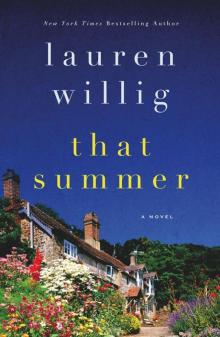 That Summer: A Novel
That Summer: A Novel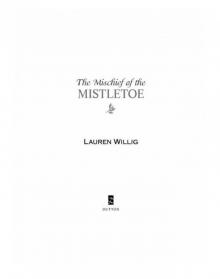 The Mischief of the Mistletoe: A Pink Carnation Christmas
The Mischief of the Mistletoe: A Pink Carnation Christmas